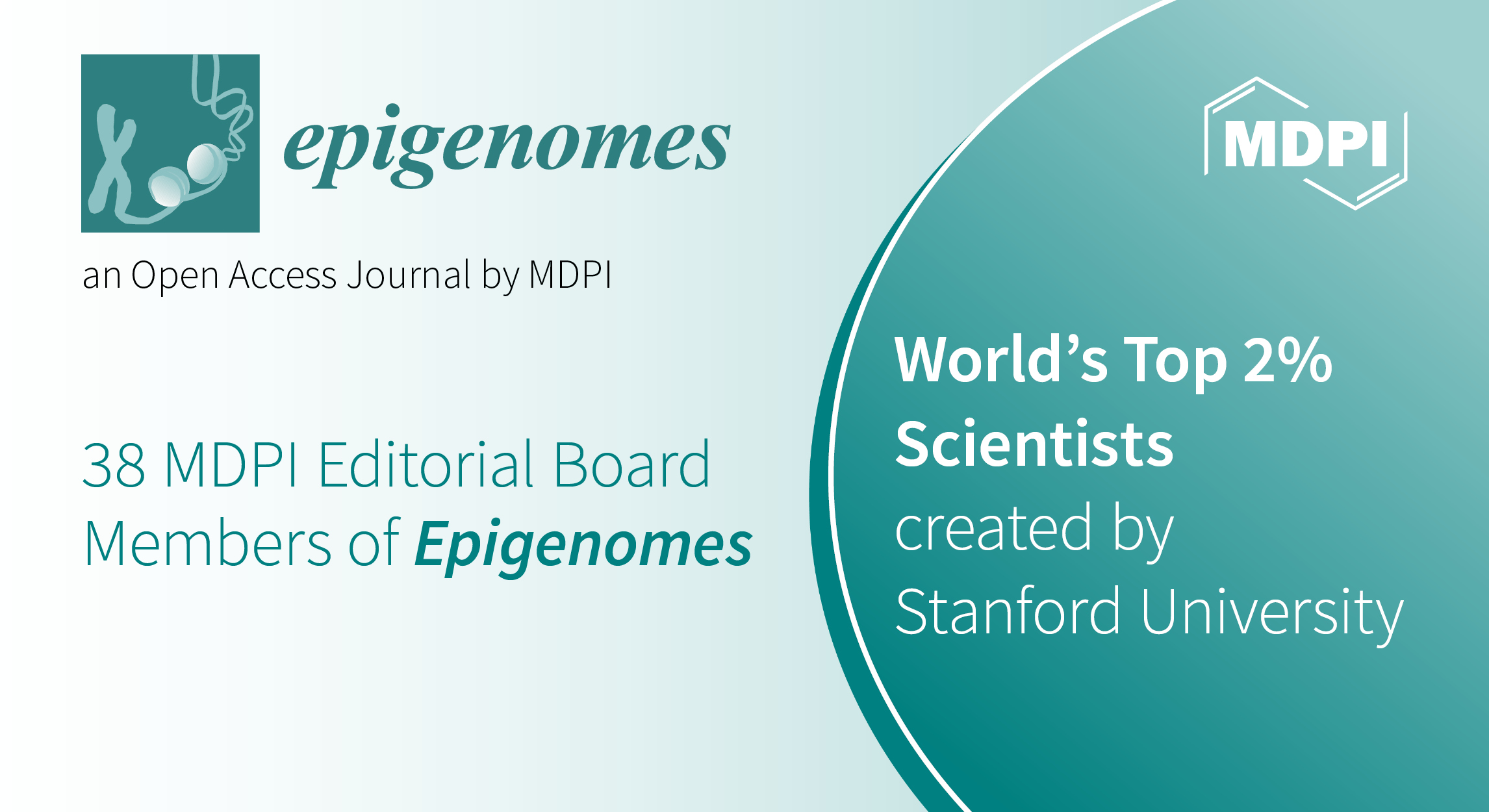
Editorial Board Members from Epigenomes Featured in Stanford’s List of the World’s Top 2% Scientists
Stanford University has recently published an update of the list of the top 2% most widely cited scientists—the World’s Top 2% Scientists.
The time node of the statistical data of this list is from 1960 to 2022, and it is divided into two lists: "Lifetime Scientific Influence Ranking" and "2022 Annual Scientific Influence Ranking". The "Lifetime Scientific Influence Ranking" counts the comprehensive influence performance of scientists during their careers, and the "2022 Annual Influence Ranking" focuses on highlighting the academic influence of scientists in the previous year. This ranking, considered the most prestigious worldwide, is based on the bibliometric information contained in the Scopus database and includes more than 200,000 researchers from the more than 10 million scientists considered to be active worldwide, with 22 scientific fields and 176 subfields taken into account.
We are pleased to share that 38 Editorial Board Members from MDPI’s journal Epigenomes (ISSN: 2075-4655) were featured in Stanford University World’s Top 2% Scientists list in 2022.
|
Name |
Affiliation |
|
Prof. Dr. Albert Jeltsch |
Universität Stuttgart |
|
Prof. Dr. Andrew E. Teschendorff |
University of Chinese Academy of Sciences |
|
Prof. Dr. Assam El-Osta |
Monash University |
|
Prof. Dr. Bin Tean Teh |
National Cancer Centre, Singapore |
|
Prof. Dr. Craig L. Peterson |
University of Massachusetts Chan Medical School |
|
Dr. Daniel De Carvalho |
Ontario Cancer Institute University of Toronto |
|
Dr. Eric Lieberman Greer |
Harvard Medical School |
|
Prof. Dr. Ernesto Guccione |
Icahn School of Medicine at Mount Sinai |
|
Prof. Dr. Frank Lyko |
DKFZ‑ZMBH Alliance |
|
Dr. Giacomo Cavalli |
Institute of Human Genetics, University of Montpellier |
|
Prof. Dr. Hendrik G. Stunnenberg |
Radboud Institute for Molecular Life Sciences |
|
Prof. Dr. Isabelle Mansuy |
Universität Zürich |
|
Dr. James M. Flanagan |
Imperial College London |
|
Prof. Dr. Jörn Walter |
Universität des Saarlandes |
|
Prof. Dr. Juan Ausió |
University of Victoria |
|
Dr. László Tora |
Inserm |
|
Prof. Dr. Luciano Di Croce |
Centre for Genomic Regulation (CRG) |
|
Prof. Dr. Marco Giorgio |
University of Padua |
|
Dr. Martin E. Fernandez-Zapico |
Mayo Clinic |
|
Prof. Dr. Melanie Ehrlich |
Tulane University School of Medicine |
|
Prof. Dr. Olga Kovalchuk |
University of Lethbridge |
|
Dr. Patrick O. McGowan |
University of Toronto |
|
Prof. Dr. Paul A. Wade |
National Institute of Environmental Health Sciences |
|
Prof. Dr. Peter C. Dedon |
Massachusetts Institute of Technology |
|
Prof. Dr. Qian Tao |
Prince of Wales Hospital Hong Kong |
|
Prof. Dr. Richard L. Momparler |
CHU Sainte-Justine - Le Centre Hospitalier Universitaire Mère-Enfant |
|
Prof. Dr. Robert A. Waterland |
Baylor College of Medicine |
|
Dr. Robert Feil |
Centre National de Recherche Scientifique (CNRS) |
|
Dr. Robert J. Schmitz |
University of Georgia |
|
Dr. Roderic Guigó |
Centre for Genomic Regulation (CRG) |
|
Dr. Ryan Lister |
The University of Western Australia |
|
Prof. Dr. Ryszard Maleszka |
Australian National University |
|
Prof. Dr. Steven E. Jacobsen |
University of California, Los Angeles |
|
Prof. Dr. Susan J. Clark |
Garvan Institute of Medical Research |
|
Prof. Dr. Ueli Grossniklaus |
University of Zürich |
|
Prof. Dr. Victor G. Corces |
Emory University School of Medicine |
|
Prof. Dr. Xiaodong Cheng |
The University of Texas MD Anderson Cancer Center |
|
Prof. Dr. Yasushi Hiraoka |
Osaka University |
The latest Stanford rankings reflect the significant influence and research excellence of the scientists, who are committed to furthering their knowledge for the benefit of the world.
We would like to congratulate our Editorial Board Members on their excellent achievement and thank them for their immense contribution to the scientific progression and development of Epigenomes.
